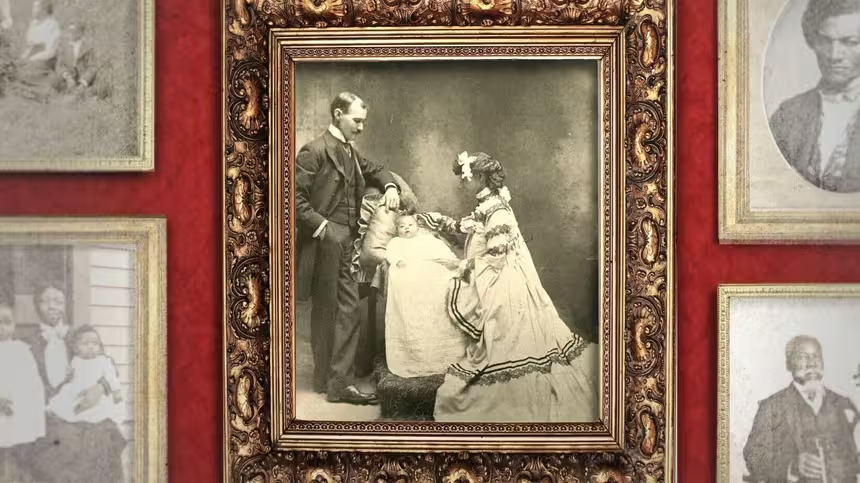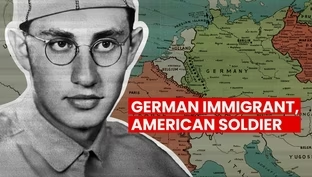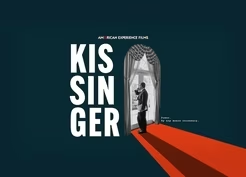
Chapter 1 | Kissinger, Part 1
Preview: Season 37 Episode 6 | 9m 3sVideo has Closed Captions
Watch a preview of Part One of Kissinger.
Watch a preview of Part One of Kissinger.
Problems playing video? | Closed Captioning Feedback
Problems playing video? | Closed Captioning Feedback
Corporate sponsorship for American Experience is provided by Liberty Mutual Insurance and Carlisle Companies. Major funding by the Alfred P. Sloan Foundation.

Chapter 1 | Kissinger, Part 1
Preview: Season 37 Episode 6 | 9m 3sVideo has Closed Captions
Watch a preview of Part One of Kissinger.
Problems playing video? | Closed Captioning Feedback
How to Watch American Experience
American Experience is available to stream on pbs.org and the free PBS App, available on iPhone, Apple TV, Android TV, Android smartphones, Amazon Fire TV, Amazon Fire Tablet, Roku, Samsung Smart TV, and Vizio.
Buy Now

When is a photo an act of resistance?
For families that just decades earlier were torn apart by chattel slavery, being photographed together was proof of their resilience.Providing Support for PBS.org
Learn Moreabout PBS online sponsorshipPresident-elect Nixon today named Dr.
Henry Kissinger, the German-born Harvard professor, as his White House policy adviser on defense and foreign affairs.
ROGER MORRIS: In 1968, when Henry Kissinger was named national security adviser, he was not at all well-known, and certainly not as famous or as celebrated as he would become.
I enthusiastically accept this assignment and I shall serve the president-elect with all my energy and dedication.
SAM HOSKINSON: There was something about him that was different, like the way he talked.
I have tried to avoid labels like "hard" and "soft."
HOSKINSON: Here's this Harvard professor, kind of a nerd, nerdish guy, that became one of the most powerful men in the world.
KISSINGER: I believe that what America does is of great consequence to the peace of the world and to the progress of humanity.
NIALL FERGUSON: He entered the realm of power and bestrode it as a geopolitical colossus.
BEN RHODES: He had enormous power, more power than any unelected official probably in the history of this country.
JEREMI SURI: And the moments he lashes out most are the moments he feels powerless.
We are not talking about an attack on a neutral country.
BARBARA KEYS: The secrecy, the lying, the denial of reality, those are all Kissingerian.
GREG GRANDIN: I don't think that he had much concern for the human costs of his actions.
KISSINGER: The question about the relationship of morality to foreign policy is a very complex one.
RICHARD HAASS: I don't think he'd deny that he overlooked certain human rights.
He would just say, "There were other factors at stake."
KISSINGER: Sometimes statesmen have to choose among evils.
ROHAM ALVANDI: He wasn't trying to win a popularity contest.
He was trying to implement his ideas.
(shouting) KISSINGER: I believe we have an obligation to prevent the totalitarians from taking over the world by force.
PETER KORNBLUH: Yes, he was brilliant.
But in the end, his legacy is about the number of people-- and we're talking hundreds of thousands-- that died because of the arrogance of his policy.
FERGUSON: Nobody before or since has played such an important role in American foreign policy.
We've had to recognize it's Henry Kissinger's world.
(phone ringing) ♪ ♪ ♪ ♪ (explosions pounding) ♪ ♪ (explosions pounding) (shouting) PROGRAM NARRATOR: Tonight, Henry Kissinger talks about war and peace and about his decisions at the height of his powers.
KISSINGER: I was brought up in a totalitarian society, and therefore I had perhaps a better sense for the fragility of institutions, and for the potential evil that can break forth when restraints disappear.
(people shouting) FERGUSON: One has to remember that Henry Kissinger was born at a time when Germany was in a state of near-revolutionary upheaval.
ALVANDI: In the 1920s, the economic crisis of hyperinflation that engulfs Weimar Germany, combined with the sense of grievance about the terms imposed on Germany after the First World War, generates the rise of a very vicious right-wing fascist movement... ALL: Heil!
ALVANDI: ...for whom Jews are the scapegoats.
And the Kissingers, like a lot of German Jews, had no sense of what was going to come for them in the 1930s.
MAN: Heil!
CROWD (responding): Heil!
Heil!
Heil!
Heil!
Heil!
(church bells ringing) ♪ ♪ FERGUSON: Fürth in Bavaria had a significant Jewish population in the 1920s.
Heinz Kissinger is born into one of the Orthodox families in Fürth, and grows up in a middle-class Jewish household.
Heinz had two distinctive features: a brilliant mind and indefatigable energy.
Well, if he got the brilliance from his father, Louis, he got that endless energy from his mother, Paula.
Their Jewishness is serious-- they're Orthodox, they're kosher-- but in terms of their work and education lives, they see themselves integrated in German culture.
ANGUS REILLY: Despite his later reputation, he's not a particularly studious child.
His mother complains that him and Walter are always running away from kindergarten.
PAULA KISSINGER: Henry was born in '23 and Walter was born in '24.
And they were terrible naughty and hard to handle.
DAVID KISSINGER: He always said that he was a gregarious, fairly frivolous young man.
And he maintained that he had a rather happy childhood.
(shouting) (band playing) FERGUSON: But the childhood came to an abrupt end with the rise of the Nazis.
(people shouting) (speaking German): ALVANDI: The Jewish community, which had been very well integrated into a fairly liberal and cultured Germany, suddenly finds itself the target of the wrath of the German right.
For people like the Kissingers, this is a shock.
There is a deep reluctance to believe the depth that this depravity can reach.
THOMAS SCHWARTZ: Kissinger remembered that when he and his brother would take their bicycles to go visit their grandfather, he would see the signs saying "Jews are not wanted here."
And Kissinger commented later about how everything seemed changed.
KISSINGER: I was prohibited to go to German schools.
All the German people with whom my parents associated more or less cut off all contact with us.
(speaking German): KISSINGER: A policy of segregation for Jewish people was created, and my father lost his job.
MAN: Sieg!
CROWD: Heil!
MAN: Sieg!
CROWD: Heil!
MAN: Sieg!
CROWD: Heil!
REILLY: Because Louis is an employee of the German state, he is sacked, and it, it devastates him.
He got so much fulfillment out of his job as a teacher, and then suddenly he was bereft, he was lost, and he withdraws in on himself, and Kissinger feels distanced from his father.
KISSINGER: My father was a teacher and not a practical man.
And he was sort of paralyzed in the face of the evil the Nazis represented.
ALVANDI: I can't imagine how destabilizing and terrifying it must have been for Kissinger to see that world around him that he so admired turning against him, that a society that was seemingly so civilized, so refined could descend into this kind of madness.
REILLY: There is a sense of a lost world that he'll never be able to return to.
His childhood featured that profound loss of innocence, of joy and prosperity and, and ease.
KISSINGER: That was a wrench in my life that had a deep impact on me.
It was the possibility that what had given you security could disintegrate.
How WWII Shaped Henry Kissinger's Identity
Video has Closed Captions
Clip: S37 Ep6 | 3m 41s | Kissinger escaped Nazi Germany and emigrated to the U.S., where he was drafted in the U.S. Army. (3m 41s)
Trailer | Kissinger | American Experience
Video has Closed Captions
Preview: S37 Ep6 | 2m 53s | The life of the brilliant foreign policy powerbroker who shaped the world in which we live. (2m 53s)
Providing Support for PBS.org
Learn Moreabout PBS online sponsorshipSupport for PBS provided by:
Corporate sponsorship for American Experience is provided by Liberty Mutual Insurance and Carlisle Companies. Major funding by the Alfred P. Sloan Foundation.



















